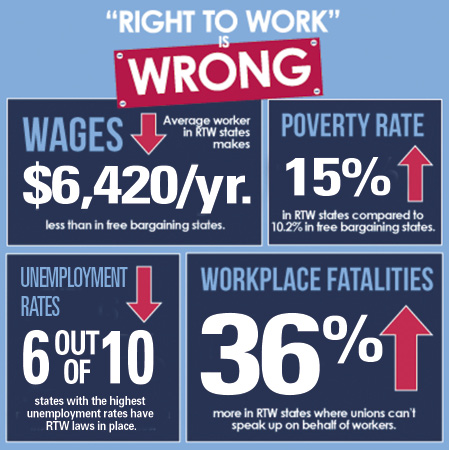Protecting Freedom or Trampling Workers’ Rights?
September 11, 2014
(This article appears in the September/October 2014 issue of The American Postal Worker magazine.)
 Isn’t it amazing that every time anti-union groups claim they are protecting our freedom, they are actually steamrolling working people?
Isn’t it amazing that every time anti-union groups claim they are protecting our freedom, they are actually steamrolling working people?
Take the so-called “right to work” legislation that has been proposed in many states. Its supporters claim they are defending an employees’ freedom to work.
The National Right to Work Legal Defense Foundation website says:
“‘Compulsory union representation’ deprives employees, even in Right to Work states, of their right to bargain for themselves.” [Emphasis added.]
Can you imagine what our wages and benefits would be if each one of us had to negotiate our wages, hours and working conditions individually?
The only right the anti-union folks want to defend is our right not to be organized for our own protection. They are fighting to protect our freedom to beg for a raise, to hope we won’t get fired on a whim, and to be treated any way management wants.
With flags waving they will fight for our freedom – from union contracts, from safety regulations, from any kind of government oversight and from guaranteed healthcare. Instead of the strength of a collective voice, they want weak, individual voices.
People already have the right to work – if they can find a job – and no union contract denies them that right.
The “right-to-work” groups seek to make “union shop agreements” illegal. These contractual provisions require all workers who benefit from collective bargaining to pay their fair share – which has nothing to do with anybody’s right to work.
If a company has a union shop agreement, employees who decline to join the union must pay a fee for the services they receive. That’s because the union has “exclusive representational rights” under federal law. “Exclusive representation rights” empower and require union officials to represent all employees in a company’s bargaining unit – including those who refuse to join the union and therefore don’t pay union dues.
The Postal Service is considered an “open shop;” non-members cannot be charged for representation, even though they benefit from all the provisions of the union-negotiated contract.
Why is this issue important to postal workers? Because state legislatures across the country are promoting “right to work” laws that would make it illegal for unions to negotiate a clause that requires everyone who benefits from union bargaining to pay their fair share. It is important to postal workers because we can never hope to negotiate a union shop agreement as long as our brothers and sisters are denied that right.
If someone came into your home every day, sat down at your dinner table, and ate the food you had purchased, you would throw the freeloader out on their ear. Yet that is exactly the so-called freedom the right-to-work crowd wants to protect for non-members – the freedom to be a freeloader. The freedom to receive the pay and benefits the union has negotiated without contributing a dime.
Don’t be fooled by the slick name. The only freedom they want to defend for workers is the freedom to be exploited.
Getting It Done at the Convention
The reality of a reduced membership base is that the union must be restructured. The restructuring and other changes were done at the APWU 22nd Biennial National Convention in Chicago.
After spirited debate, the duties of five vacant national-officers positions were absorbed into existing positions. Those positions were Assistant Legislative/Political Director, National Maintenance Representative-at-Large, Assistant Clerk Craft Director, and two National Business Agent positions. Three of the eliminated positions were based in Washington, DC; the NBA positions were field positions.
The debate centered on whether union representation required full-time officers rather than part-time advocates. These are some of the same discussions that local unions are having. Full-time officers require not only full-time salaries, but also the accompanying benefits. Part-time officers are used as needed, without the need to pay full benefits. When union membership and postal employment were at their peak in the 1990s, the national union and locals could justify adding full-time positions to handle the business of the union. Now, with the decrease in membership, the same principle applies, only in reverse.
The decision to trim the officers’ structure was a difficult but necessary step. Your national officers have taken those steps and are attempting to lead by example. We hope that these steps will assist local and state leaders in adjusting their own officers’ structures to more efficiently serve the members of this great union.
Another major change was the adoption of a new schedule for national conventions. Rather than meet for five days, the delegates adopted an amendment that cut the convention to four days but extended the hours that the delegates would meet each day. This change allows the national union along with local and state unions to eliminate a day of housing, meals, and cost of the convention facilities. This will result in a significant savings for all. Again, this is a step taken by the delegates to more efficiently serve the members of this great union.



